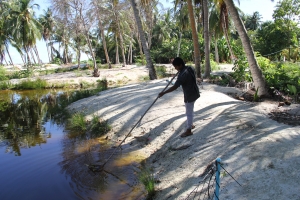Faresmaathoda - From dumpsites to roads and parks
The Island’s transformation from dumping to managing waste offer optimism for the future.
Location: Bangkok, Thailand. 29th Mar 2017
AND IT BEGINS...
Kulhi, Faa Chasbin or mangroves are common to the Northern and Southern atoll islands of Maldives. Typically, you might find more than one of these mangrove wetlands if you visit any of these islands.The island of Faresmaathoda in South Huvadhu atoll has a “kulhi” lake as well, though it’s much smaller than what you may usually encounter.
DUMPSITE (KUNIGONDU) IS NOW A SOCIAL PARK...
A few Kandoo (Small-leafed orange mangrove) trees surround the swamp, adding to the already heart-warming aesthetics. In the evening, children and young people gather around the pond, lounging around in joalifathi (traditional Maldivian recliner benches) playing guitar and socializing with their friends.
ZUHAIRA'S THOUGHTS...
The place didn’t always look like this:“You couldn’t even see a pond when you passed by. There would be all kinds of waste surrounding the area. The pond was inaccessible due to the loads of waste surrounding it”, Mariyam Zuhaira, a 61-year-old woman who lives nearby, recalled.
MANIK GOT A NEW CHILL-OUT SPACE...
The area around the Kulhi used to be the major dumpsite of the island community. This has been the case for many years, Mohamed Manik, an elderly man sitting by the lake explained:“I don’t remember a time when waste was not dumped here. I don’t think anyone in this island would either” - Manik, 54 years.Manik now spends his afternoons sitting by the lake under the cool shade of the coconut palms, sometimes feeding the fish that live in the pond.“There are many mosquitoes here. But before all this, you couldn’t tolerate staying here. It’s gotten a lot fewer now.” Manik says pointing at the fishes.
WHAT CHANGED?
LEARNING AND INNOVATING...
The island council together with Red Production and Mangroves for the Future team are now experimenting different ways of dealing with the waste.They found that mixing seaweed with the leaf litter halved the time of composting, reduced an immense amount of labour and saved space for additional compost piles. The seaweed compost also has a higher nutritious content which means it can attract a higher value.The council is also recycling items to reduce the waste for transportation. The storage cabinet of the waste management center is a discarded refrigerator.Many such dustbins made from old washing machines are installed in public spaces in the island.Another interesting innovation is an electronic compost sieve retrofitted with a motor salvaged from a discarded machine. This has proved to be especially helpful since it saves time as opposed to manually doing it and also has eliminated the work needed to dry it out because previously it needed to be spread out in the sun.
A SPARK FOR MANY MORE INITIATIVES...
Within the course of just a year the project has brought about an incredible transformation to the island.After piloting the project, the councilors initiated an island clean-up to clear traditional dumpsites, making way for exciting new possibilities for the island. “Before the project, the closest way out of the woods (to the beach) was a waste dumpsite for the islanders. These outer roads used to be dumpsites before we opened the center and cleaned up the island.” – Mohamed Sobah, Member of Faresmaathoda Island council. Sobah is now in charge of the waste management project on behalf of the council. The area of waste management had peaked his interest and now he attends waste management training and seminars in the capital of Male’ on behalf of Faresmaathoda.
A VISION TO PUT AN END TO OPEN BURNING...

Lagoon Clean-up Maldives, Maldives © Abdulla Adam and Makdhooma Nazim